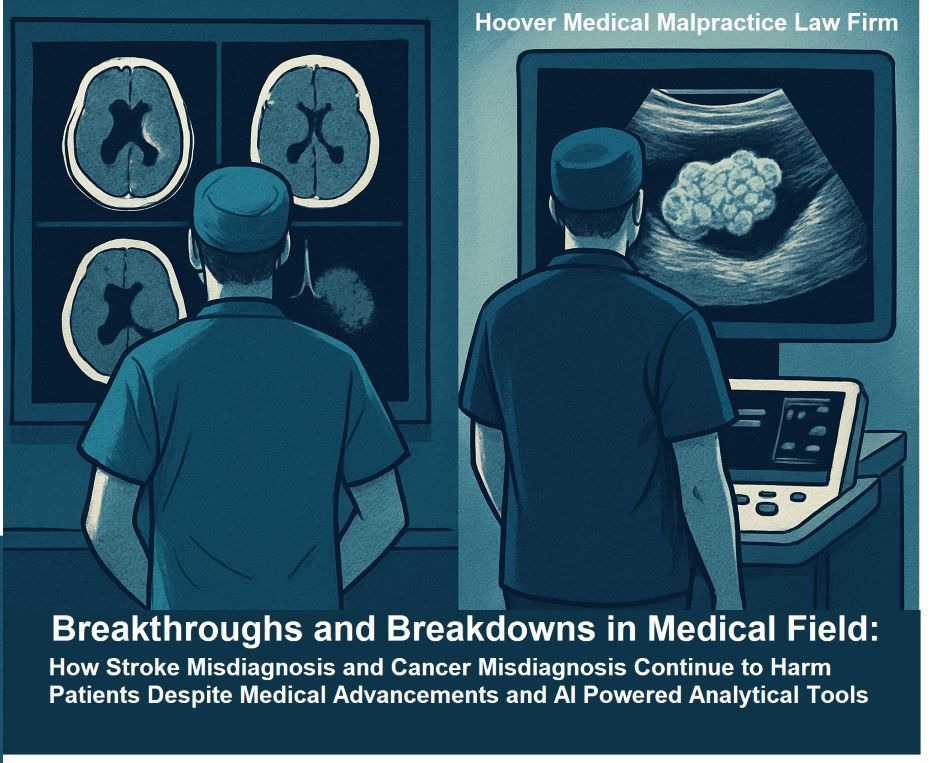Is It Too Late to Get Justice? Discovery Rules and Deadlines in Philadelphia Personal Injury Claims
- Dave Hoover
- Apr 24, 2025
- 7 min read

When someone suffers due to medical negligence—whether it’s a mother left without proper postpartum care, a newborn injured during delivery, or a patient sent home after a missed cancer diagnosis—the clock starts ticking. But what if you didn’t know right away that medical malpractice occurred? What if financial hardship, poor mental health, or a slow and painful recovery kept you from taking legal action? At our firm, we hear this concern often. That’s why we’re here to say: it may not be too late.
Our Philadelphia medical malpractice lawyers and Philadelphia birth injury attorneys focus on helping families harmed by negligence in Philadelphia hospitals and Scranton medical facilities. Many of our clients were initially hesitant to come forward. Some were overwhelmed by the emotional toll of a traumatic birth, a sudden stroke misdiagnosis, or the realization that a loved one’s cancer was misdiagnosed. Others delayed seeking justice because of financial strain. We want every victim to know—you don’t need any money upfront to fight back. We work on a contingency fee basis, which means we don’t get paid unless and until we win or settle your case. Lack of finances should never stop you from holding a negligent doctor or hospital accountable.
Pennsylvania law sets strict deadlines for filing medical malpractice lawsuits, but it also provides important exceptions—especially when injuries aren’t immediately discoverable. These legal rules, known as the discovery rule and statutes of limitations, can make or break a Philadelphia birth injury lawsuit or a claim involving Philadelphia cancer misdiagnosis and malpractice. Yet too many families don’t know their rights until it’s too late.
This guide is for you—parents, patients, and loved ones—who deserve answers. We’ll explore the legal deadlines that apply to Philadelphia medical malpractice cases, explain how exceptions work, and show how our experienced Philadelphia medical malpractice attorneys can help you file in time. From Philadelphia neonatal care errors and surgical mistakes to cancer misdiagnosis and stroke misdiagnosis, we aim to protect your right to justice.
Let’s begin by understanding the time limits—and how they may not be as final as they seem.
What Is Medical Malpractice Meant to Do, and What Are the Most Harmful Errors?
Medical malpractice lawsuits in Philadelphia aim to compensate victims who have suffered due to negligent, reckless, or substandard medical care. These lawsuits help pay for medical bills, rehabilitation, therapy, lost income, and even long-term care. Common examples of Philadelphia medical malpractice include surgical errors, cancer misdiagnosis, stroke misdiagnosis, incorrect medications, anesthesia mistakes, and delayed emergency room interventions. In many cases, more than one party may be held liable—including doctors, nurses, surgeons, anesthesiologists, hospitals, or entire healthcare systems plagued by systemic issues like overcrowded ERs and lack of specialists. Four of the most harmful and often fatal medical errors that can lead to a lawsuit are: failure to diagnose cancer (e.g., Philadelphia cancer misdiagnosis and malpractice), failure to treat strokes on time (Philadelphia stroke misdiagnosis), surgical errors causing organ damage or infection, and negligent neonatal care (Philadelphia neonatal care errors). When these mistakes occur, justice is more than compensation—it’s a step toward protecting other patients from future harm.
What Is a Birth Injury Lawsuit, and What Are the Most Common and Harmful Birth Injuries?
A Philadelphia birth injury lawsuit is designed to provide compensation for infants harmed during pregnancy, labor, delivery, or the postpartum period due to medical negligence. This compensation is crucial for ensuring a child’s long-term care, therapy, and developmental support. The five most common and devastating errors during childbirth include failure to perform a timely C-section, misuse of forceps or vacuum extractors, failure to monitor fetal distress, mismanagement of shoulder dystocia, and failure to recognize umbilical cord problems. These mistakes can lead to lifelong conditions such as Cerebral Palsy, Hypoxic-Ischemic Encephalopathy (HIE), Brachial Plexus Palsy, Erb’s Palsy, and severe developmental delays. Hypoxia, or lack of oxygen during delivery, can result in irreversible brain damage. Similarly, umbilical cord suffocation—especially when the cord is wrapped around the baby’s neck and not promptly addressed—can cause asphyxia, organ failure, and even wrongful death. These devastating outcomes are preventable, and our firm is dedicated to holding negligent hospitals accountable.
How Much Time Do You Have to File a Medical Malpractice Lawsuit in Philadelphia?
Under Pennsylvania law, the statute of limitations for Philadelphia medical malpractice lawsuits is generally two years from the date the injury occurred or when the patient reasonably should have discovered the injury. This means if you underwent a botched surgery, received a misdiagnosis, or were neglected in a crowded ER, you must act within two years to preserve your legal rights. But what if you were recovering in the hospital, disabled, or undergoing invasive treatment and unable to act promptly? In such cases, a family member or individual with power of attorney can file on your behalf. This is why hiring an experienced Philadelphia medical malpractice attorney is crucial—they can ensure all deadlines are met, especially while you're focused on healing. Hospitals and their insurance companies often try to minimize your compensation or deny liability altogether, but we work to achieve the best possible outcome on time, using every legal tool available.
What Are the Statute of Limitations Rules for Birth Injury Lawsuits?
When it comes to Philadelphia birth injury lawsuits, the statute of limitations has two key components. For parents or legal guardians filing on behalf of an injured child, the deadline is typically two years from the date of the injury or the discovery of harm. However, when the injured child becomes an adult, they have until their 20th birthday to file a lawsuit independently. That gives them two years from the time they turn 18 to seek justice for injuries they suffered during birth or neonatal care. Hiring a seasoned Philadelphia birth injury lawyer is essential because filing late—or failing to properly investigate the case—can jeopardize your ability to recover compensation. Our legal team understands how to protect your rights from the start, gather critical evidence, and prevent your case from being dismissed due to procedural issues.
What Is the Discovery Rule in Medical Malpractice Lawsuits, and When Can It Extend the Deadline?
You may be asking, “Can you still file a medical malpractice lawsuit if the injury was not immediately evident?” The answer is yes—thanks to the discovery rule, which can extend the statute of limitations. In Philadelphia medical malpractice cases, the clock begins ticking not when the negligence occurs, but when the injury is discovered—or should have been discovered with reasonable diligence. This is especially important for conditions like cancer misdiagnosis, surgical errors that cause internal injuries, anesthesia errors, nerve damage from orthopedic surgeries, and repeated prescription drug overdoses. If a doctor’s negligence was ongoing or repeated (such as failing to monitor a chronic illness or continuously prescribing harmful medications), the time may not start until the last act of negligence. These cases are complex, but our Philadelphia medical malpractice lawyers have the expertise to determine if your case qualifies under the discovery rule.
How Do Exceptions and the Discovery Rule Apply to Birth Injury Lawsuits?
In Philadelphia birth injury cases, the discovery rule is often the lifeline for families who were unaware of the damage caused during labor or delivery. Many parents do not immediately know that a delayed C-section or prolonged labor caused brain damage until their child begins missing developmental milestones. For example, speech delays, poor motor skills, lack of coordination, muscle stiffness, and learning difficulties might only become evident months or years after birth. Common injuries discovered later include Cerebral Palsy, HIE, microcephaly, Autism Spectrum Disorders resulting from trauma, and cognitive disorders related to neonatal asphyxia. To maximize compensation for special education, ongoing therapies, and long-term care, parents should seek legal help as soon as suspicions arise. Waiting until you “have the money” can be devastating—our Philadelphia birth injury attorneys work on contingency, meaning we do not charge anything unless we win your case. Early action gives us time to build the strongest possible claim.
What Happens If You Don’t File a Medical Malpractice Lawsuit Within Two Years?
Failing to file a Philadelphia medical malpractice lawsuit within the two-year statute of limitations can have severe consequences. If the court determines your claim is untimely, your case can be dismissed without ever being heard—no matter how valid your suffering is. Once the deadline passes, the right to sue may be permanently lost.
However, there are limited exceptions, like the discovery rule, disability, or fraud by the healthcare provider that concealed the harm. To preserve your right to seek justice, it is essential to act swiftly and consult a knowledgeable Philadelphia medical malpractice lawyer who can evaluate your case, investigate timelines, and identify any exceptions that may apply. Don’t let a technicality rob you of your chance to hold negligent doctors and hospitals accountable.
Can You File a Birth Injury Lawsuit Later If the Parents Missed the Deadline?
If parents failed to file a Philadelphia birth injury lawsuit within the standard deadline, it may still be possible for the injured child to seek justice later. As mentioned, a child injured at birth typically has until their 20th birthday to file a lawsuit. But once that window closes, the opportunity to recover compensation may be permanently lost. Waiting too long can mean you lose the only chance to get help paying for lifelong therapy, assistive devices, or education plans. Our experienced Philadelphia birth injury attorneys can step in to help you evaluate deadlines, request medical records, and determine whether any exceptions apply. We also work with families to file cases in time, even if they’re emotionally exhausted, financially strained, or overwhelmed with caregiving responsibilities. Let us help preserve your right to seek compensation before time runs out.
Why Is Time So Crucial in Medical Malpractice and Birth Injury Cases?
Every day counts when pursuing justice in Philadelphia medical malpractice and Philadelphia birth injury lawsuits. Not only are there strict legal deadlines, but valuable evidence—such as hospital records, staff logs, and witness statements—can be lost or destroyed with time. That’s why hiring an experienced legal team like ours is essential. We understand that the trauma of medical negligence is life-altering. Whether you’re recovering from a preventable surgical error, enduring worsening symptoms from a misdiagnosed cancer, or raising a child with severe birth injuries, weFpe are here to support you. We help families affected by Philadelphia neonatal care errors, postpartum negligence, and long-term pediatric disabilities.
Every case is different, and in some circumstances, exceptions to the statute of limitations may apply. Don’t let the complexity of your case delay your action. Contact us today for a free consultation—we will listen, guide, and fight for the justice you deserve. You can call us 24/7 at (267) 490-3988





Comments